Sarah Palin's Favorite Meal
« previous post | next post »
John McCain's choice of Sarah Palin as his running mate has not been without controversy, but I think that we can all agree that one way in which it has been a good thing is that it has increased the visibility of the important topic of moose, which in burger form is reportedly her favorite meal. For those of you who are alcestically challenged, this is a bull moose:

And this is a cow:
I'd better clarify that. The photograph above is of a cow moose. The photograph below is of a cow. Every year any number of

You can distinguish a moose from other cervids very easily by the antlers: only the antlers of moose are palmate (broad and spread out, like the palm of the hand).
Here in Carrier country moose are an important source of both food and hides, so it isn't surprising that there is a fairly refined vocabulary for them. In general, moose are called either dʌni or xʌda. The bull moose is dʒejo, the cow either dʌniʔat "moose wife" or xʌdats'e "female moose". The calf is called tsije, which is probably a loan from Sekani meaning "little yellow thing", reflecting the fact that moose calves tend to have a jaundiced appearance. In the photo below, you can see the calf's yellowish coloration.
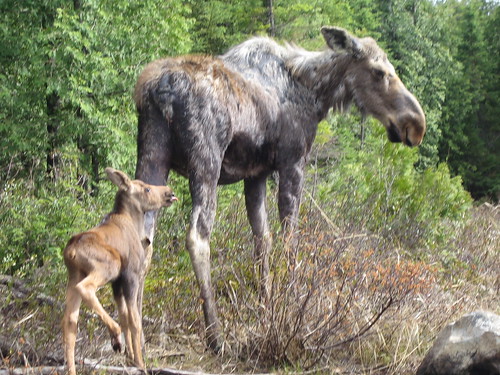
When the calves have been weaned, they are called tʃ'abedʌnis̪tʃut. A dry cow is called dets'it, while a newly sexually mature cow that has not yet had a calf is called a tʃandʒu.
The terms for the parts of a moose are the same as the body part terms for other animals, with the exception of the dewlap or "goatee", which is called dʌnitʃʌl. Another term for the dewlap is dʌtʃ'ʌkʷ jenʌxwʌle, literally "the thing that porcupines play with", reflecting the fact that moose and porcupines are considered to be friends.
I don't have a picture of that, but moose actually do occasionally play with other smaller animals.
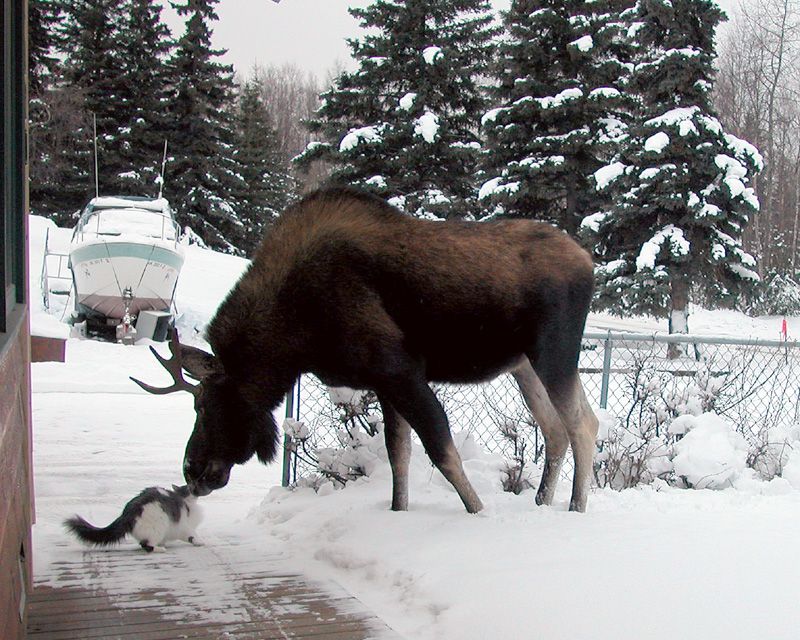
English and French have less elaborate terminology for moose, but interestingly, in both languages, the term used in North America is different from the term used in Europe. The term moose used in North American English is a loan from Eastern Abenaki moz, cognate to the Plains Cree word more familiar here in Western Canada, mōswa. In British English, moose are called elk, a word that goes back to Proto-Indo-European. The animal called elk in North American English is a different species, Cervus canadensis.
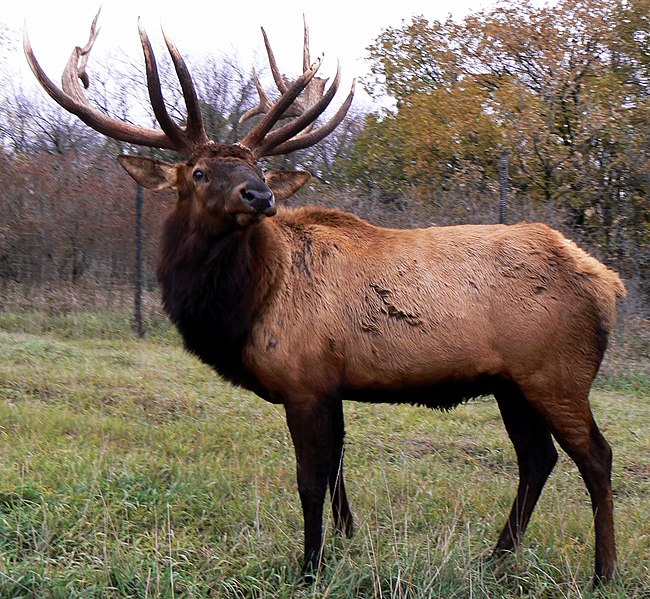
Notice the more robust body, thicker, sturdier, legs, slenderer snout, and non-palmate antlers.
The Canadian French term for moose is orignal, which comes from Basque oreina "deer" via orignac, the form that the Basque word took on in the Basque-Micmac pidgin used by the Micmac and visiting Basque fishermen and whalers. The European French term, élan,is a loan from Middle High German elend, which is ultimately related to the English word elk.
The scientific name for moose, Alces alces, contains the Latin term for moose, which is a loan from some Western Germanic language. Moose are not found in Italy, so the Romans only encountered them when their conquests led them well to the North.
Why do North American English and French use different words for moose than their European counterparts? It probably reflects the fact that the early settlers were unfamiliar with moose. In Europe today moose are found in Scandinavia, the Baltic, Russia, and Siberia, In earlier times they were found in Scotland but have been extinct for several thousand years.
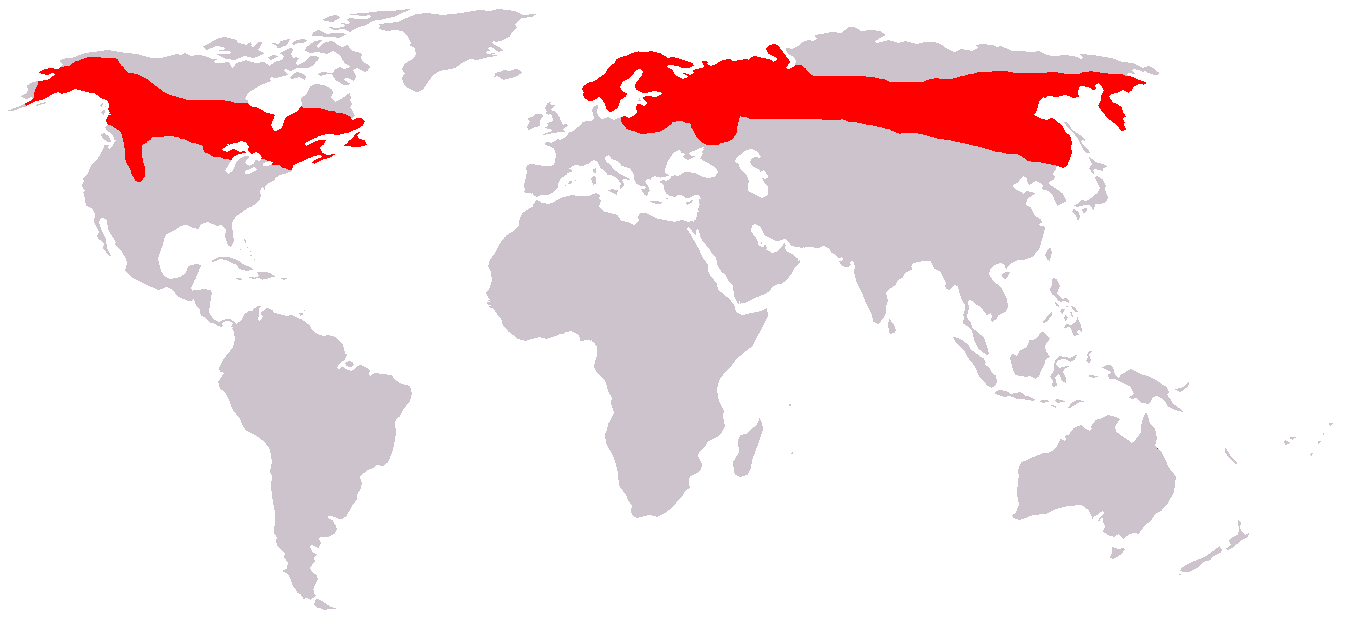
What Sarah Palin is known for, other than her liking for mooseburgers, is her reported ability to field dress a moose. Here's what the result of field dressing looks like. We've kept the head because the nose will later be cut off and boiled to be eaten. I don't know if the Palins eat moose nose.
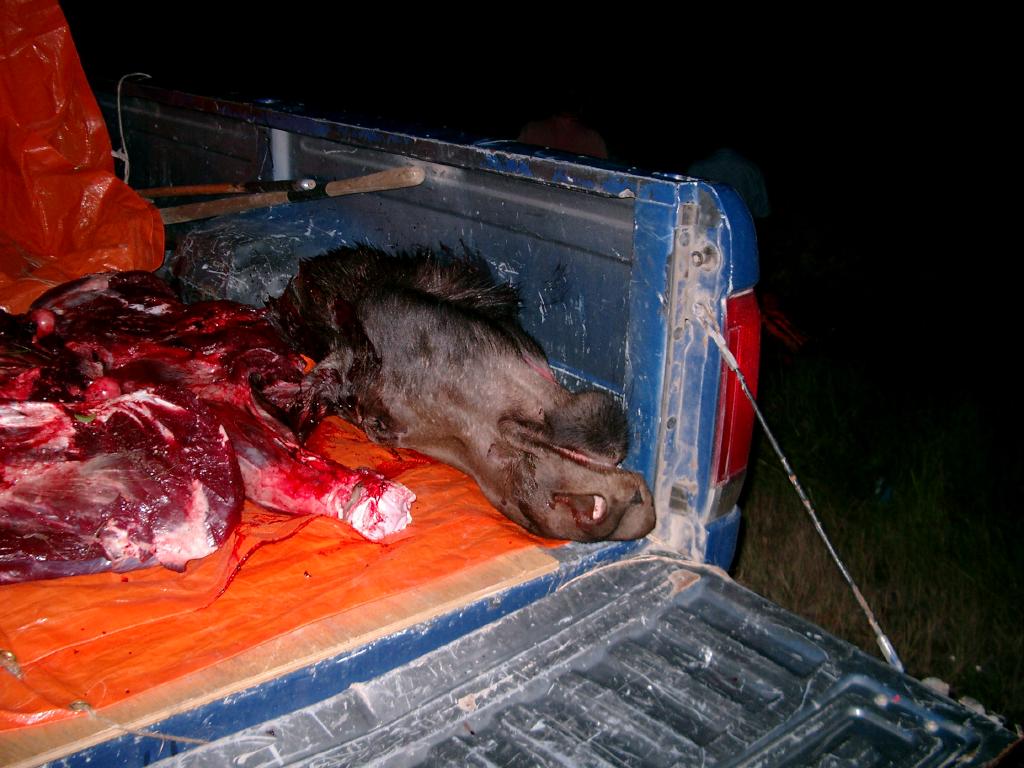
Here's what a partially dressed moose looks like. It has been opened up and the guts removed. The big shiny thing at lower left is the moose's stomach, full of partially digested food. The legs have not yet been removed, and the meat has not yet been cut off.
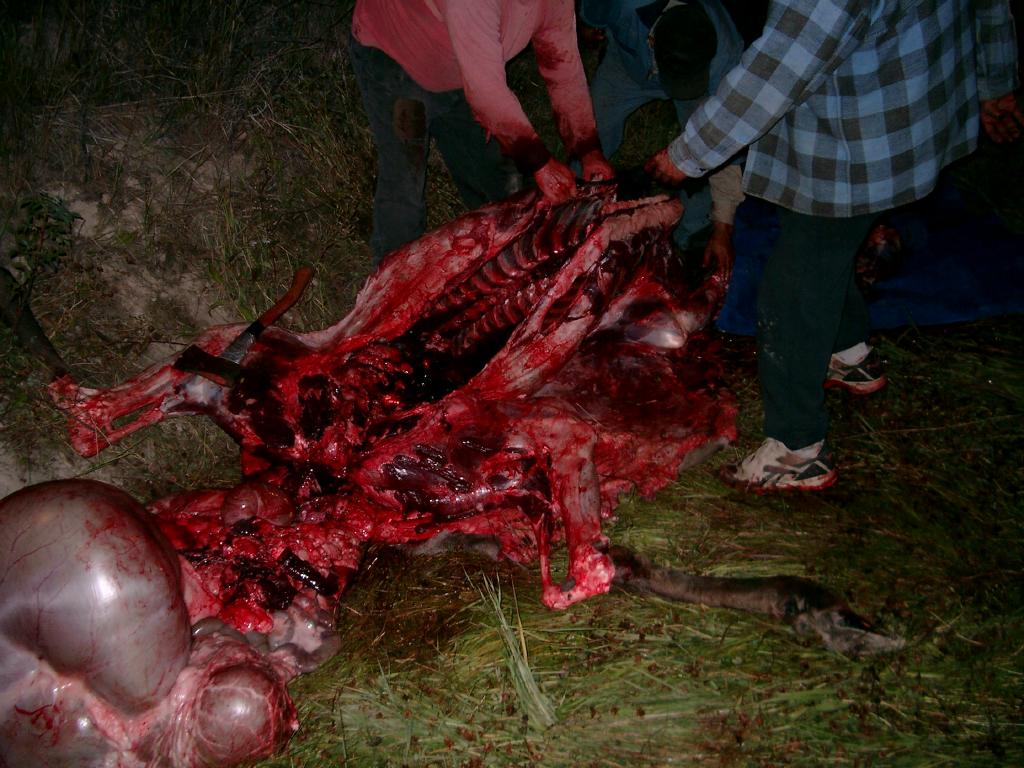
Incidentally, the proper way to remove a moose's tongue, which many regard as a delicacy, is by cutting a slit underneath and pulling it out from below. That gives you a better grip and lets you get at the root of the tongue with your knife. Here Sam has cut the slit.
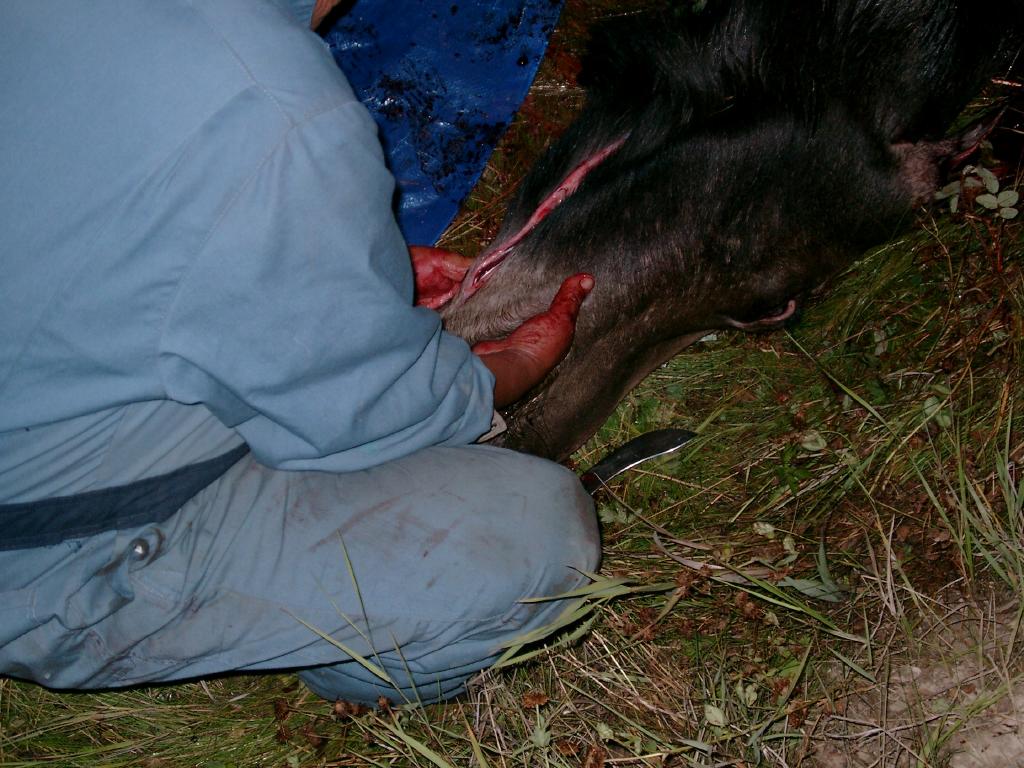
And here he is pulling out the tongue.
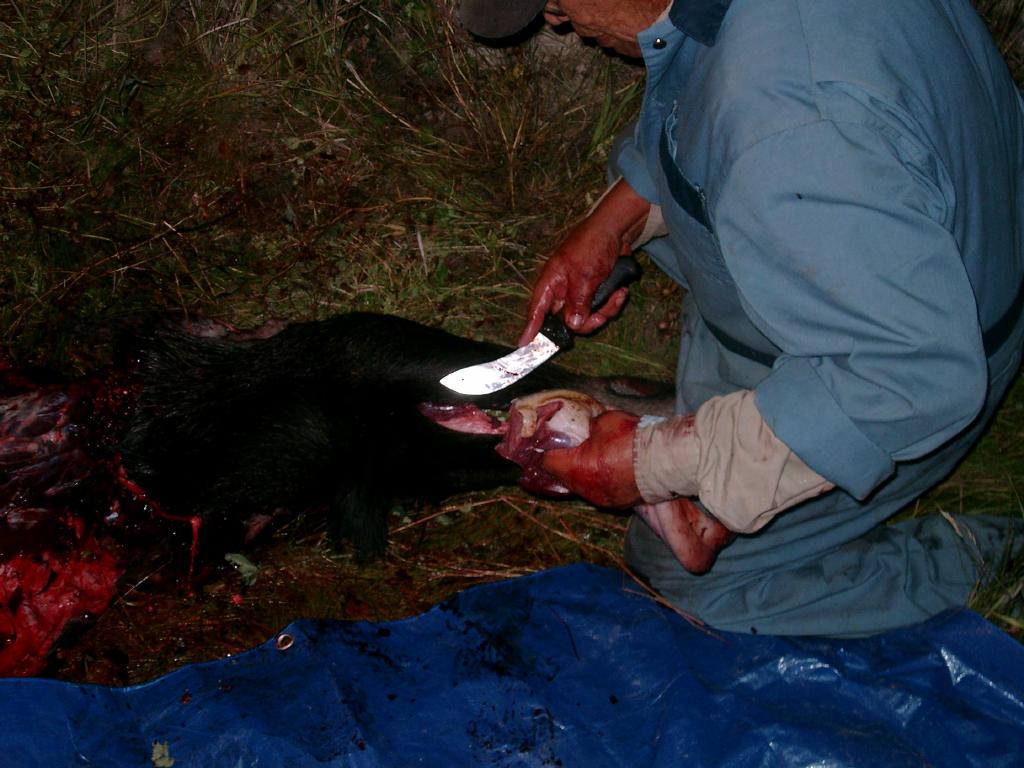
I don't know why no journalist, or Joe Biden during the debate, has asked Sarah Palin about her moose butchering technique. I would think that discerning voters would want to know.
Joe said,
October 26, 2008 @ 7:36 pm
It seems that she wants to run for President in 2012, so maybe we'll find out then. And we might also be able to get a verdict on whether a statement like "if we elect Palin, the country will be in deep moose" is grammatical or not (assuming it's not understood as having a missing word at the end).
Zeno said,
October 26, 2008 @ 7:40 pm
Whenever hunting season opened in the Sierra Nevada, farmers near the Central Valley foothills would get nervous about the L.L. Bean hunters driving up from Los Angeles in their light utility vehicles (undersized pickup trucks) to bag themselves some deer. Our local newspapers delighted in accounts of beer-sodden urbanites who splutteringly ended up explaining to sheriffs and game wardens why they were trying to haul off a black-and-white Holstein cow they had just mistaken for a stag. (The resemblance is staggering, but only if you are.) Horses were at risk, too. Heck, it was time to hide the women and children!
Karen said,
October 26, 2008 @ 7:49 pm
"Notice the more robust body, thicker, sturdier, legs, slenderer snout, and non-palmate antlers." Really? I think the wapiti elk is slenderer all around – body and legs, too, not just face.
Albatross said,
October 26, 2008 @ 7:51 pm
The hunters I know never drink while hunting. After the hunt, sure. But never around loaded guns. Those who would — and who could actually confuse a moose and a cow — are really drunken morons, and they should be labeled as such. A strikethrough is not needed.
Puzzled said,
October 26, 2008 @ 7:54 pm
"In British English, moose are called elk." Huh? I'm hoping that this is just a joke that I fail to get, rather than an assertion (about my native language) for which I cannot think of any evidence. Plenty of British people may not know for sure what an elk looks like, but I've never come across one who couldn't recognise, and name, a moose, if only on the basis of dimly remembered school lessons about Canada.
Bill Poser said,
October 26, 2008 @ 7:55 pm
@Karen,
The legs of wapiti elk seem to me to be less spindly than those of moose. As for the torso, it is true that moose may be broader. I'm not sure how otherwise to describe what I mean by "robust". The torso of wapiti elk seems solider and less fragile. Maybe I want "compact".
Mark Liberman said,
October 26, 2008 @ 9:03 pm
Puzzled: "In British English, moose are called elk." Huh?
The OED defines "elk" as
Benjamin Zimmer said,
October 26, 2008 @ 9:03 pm
BTW, the New York Times ran a photo of a young Palin at a moose-butchering party. Field and Stream was hoping for a photo of Palin gutting a moose, but settled for various other hunting pictures.
Karen said,
October 26, 2008 @ 9:23 pm
Ah, compact. Yes, I can see that.
I've been reading Åsa Larsson recently and the one I just finished is full of elk hunting. Well, actually full of elk hunters talking about it, since it's not the season, but still. I suppose, given that the dogs are called "elkhounds" it would have been odd to have a bunch of Swedes talking about hunting moose.
Bill Poser said,
October 26, 2008 @ 10:46 pm
@Puzzled,
I guess this shows the Americanization of British English.
Palin apparently also supports hunting wolves from helicopters. I have no linguistic point to make about this. Suffice it to say that I support the right of wolves to bear surface-to-air missiles.
Bill Poser said,
October 26, 2008 @ 10:58 pm
Incidentally, the name Alces malchis used by the OED is, I believe, an obsolete scientific name, reflecting a classification that recognized multiple species of moose/elk. In what appears to be the currently favored taxonomy, there is just one species, Alces alces, with half-a-dozen subspecies, with the European "elk" Alces alces alces, the moose found in Eastern North America Alces alces americana, the moose found in most of Western Canada Alces alces anderson, and the moose found in Alaska and the Yukon Alces alces gigas. Wyoming has its own subspecies: Alces alces shirasi. The remaining subspecies, found in Eastern Europe and Asia, is Alces alces cameloides. (In the same vein, one Chinese name for moose is 駝鹿 "camel deer".)
The current classification as a single species seems to be supported by studies of DNA that indicate that the American and Asian varieties separated only about 15 thousand years ago.
Puzzled said,
October 26, 2008 @ 11:04 pm
Thankyou for the OED citation, though it tells us nothing about what moose *are* called in the UK, rather than what lexicographers more or less reliably claimed they were called eighty and more years ago.
Not Americanization so much as Canadianisation, I guess (or suppose).
Bill Poser said,
October 26, 2008 @ 11:08 pm
@Puzzled
I wonder if British English speakers do not still call moose elk in reference to the European and Asian varieties? That is, granting that usage may have shifted from "elk" to "moose" in reference to the North American varieties, would someone in the UK talk about moose hunting in Norway?
Tad McIlwraith said,
October 26, 2008 @ 11:21 pm
Bill … can you speak at all about differences in moose terminology in different Athapaskan languages? I understand generally that more northerly Athapaskans use a different set of cognates for a generic moose (in Tahltan it's kedā). I can't remember what the word is in Chilcotin, but I think it is similar to the English word 'moose'.
Despite the difference for the generic word for moose, I am intrigued that the Tahltan word for bull moose, deyō, might be a cognate with the Carrier word. Indeed, the Tahltan word for dry cow is desidi. (Cow moose itself is detsīli.)
(Apologies for the lack of IPA transcriptions. I've used the Tahltan practical orthography with macrons for long vowels. The /e/ in these examples is like the English word 'bet'. The /i/ is as in the English word 'sit'.)
Skullturf Q. Beavispants said,
October 27, 2008 @ 12:04 am
Puzzled @ 11:04 pm: That would be "Canadianization". :)
(We write "colour" and "flavour" but "analyze" and "generalize".)
Don Campbell said,
October 27, 2008 @ 12:50 am
Interesting trivia: this post contains the only use of "alcestically" on the Internet (as determined by the scope of Google).
Australian English (or my dialect thereof) must have also been North Americanised as well as I would definitely call Alces alces a "moose", and would have more trouble with Cervus canadensis but would probably come up with elk or deer.
rkillings said,
October 27, 2008 @ 1:35 am
"Why do North American English and French use different words for moose than their European counterparts? It probably reflects the fact that the early settlers were unfamiliar with moose."
Presumably those settlers were also unfamiliar with caribou a.k.a. reindeer (En) or renne (Fr)?
Cheryl Thornett said,
October 27, 2008 @ 2:44 am
And don't forget that moose, like other game, is leaner than beef and tastes great; half a moose in the freezer will provide most of the meat a family needs for quite a long time. If the hunter is sensible and looks for a stupid young bull, rather than an old bull with trophy horns, the meat can be tender, tool
(A good part of my childhood was spent in Alaska.)
Dan H said,
October 27, 2008 @ 4:32 am
Puzzled: As a native, city-dwelling British English speaker, I wouldn't recognise a moose or elk if I saw one, so I'd probably call it whatever the person who pointed it out to me called it. My understanding of the animal names situation is that the early settlers to travel to North America didn't know much about biology or farming when they left, so they didn't know the names for animals or birds. Consequently, when they saw things and wanted to know what to call them, they just assigned the existing names pretty much at random.
outeast said,
October 27, 2008 @ 6:57 am
For my tuppennorth, I only discovered recently (meaning when visiting a zoo in the summer*) that the European elk and North American moose are actually the same species. Until then, I used 'moose' for the American animal and 'elk' for the European (and Asian) and simply assumed they were similar-looking but different animals.
I would not be surprised if other Brits do much the same. Certainly Basil Fawlty used 'moose' (not 'elk') to refer to the stuffed head of a Canadian specimen, tho I have no idea what assumptions he may or not have made about the beast's European brethren or how he would have referred thereto.
* Incidentally, it was in the same visit that I learned that reindeer and caribou are also the same species, similarly designated differently in Europe and America. These I had also assumed to be two different species – so, similarly, I would have expected to shoot a caribou in Canada but a reindeer in Europe. If I was ever likely to shoot either, that is.
Mai Kuha said,
October 27, 2008 @ 7:46 am
And in case anyone was wondering what variety of English Canadian moose speak, here's this:
http://www.tetesaclaques.tv/video.php?vid=831
Phil Jeddore said,
October 27, 2008 @ 7:57 am
That pic where you say "meat not removed" actually has all the meat removed…only the bones are left from what I can see.
We Lnu't (Mi'kmaq Eastern Canada ) call the Moose "Tia'm".
Nice article.
Cheers
Nicholas Waller said,
October 27, 2008 @ 8:25 am
As a Brit I have heard of elk and moose, and I usually associate elk with Scandinavia and moose with North America. Every now and then I am reminded that these are the same animal.
There was a famous "elk test" a few years ago, in which a new Mercedes-Benz A-Class car turned over in avoiding a dummy elk but an old Trabant did OK. Elks, like camels, are particularly dangerous to run into, as the car tends to drive through the spindly legs and allow the chunky body to drop on the passengers.
I gather moose is also an insulting name for unattractive women, much like dog, though I only heard this fairly recently, and oddly from an attractive woman who preferred to answer to the name of Moose (her surname being Mosse).
ajay said,
October 27, 2008 @ 8:27 am
My understanding of the animal names situation is that the early settlers to travel to North America didn't know much about biology or farming when they left, so they didn't know the names for animals or birds. Consequently, when they saw things and wanted to know what to call them, they just assigned the existing names pretty much at random.
There are a few North American animals with the same names as completely different European animals – the sparrow, for example. Corn, too, means wheat in Britain but maize in the US.
K said,
October 27, 2008 @ 9:20 am
Outeast, so caribou and reindeer are the same?! I'm seeing an environmental protection angle to this. Drilling in ANWR and threatening caribou habitat already makes plenty of us feel sorry for the caribou, but think if we started calling the caribou *reindeer*! The emotional difference would be huge! Drilling advocates might just as well propose arresting Santa Claus for breaking and entering.
John Lawler said,
October 27, 2008 @ 9:32 am
Interestingly, there are in the USA two widespread fraternal organizations named alcestically: the Loyal Order of Moose (obLing: note the venereal zero plural) and the Benevolent and Protective Order of Elks, usually known locally as 'the Moose club' and 'the Elks club' which terms also apply to the local club buildings. The Elks use an image of Cervus canadensis as a trademark, while the Moose use (some variety of) Alces alces.
Consequently, few Americans would ever mistake one for the other, and we are reliably surprised if we find out that Europeans call a moose an elk (in our terms, at least).
BTW, "Moose" is a common American nickname for large young males. It's not necessarily an insult, especially when applied to an (American) football player, but it usually connotes slowness and density; a guy called "Moose" is almost always a lineman, and almost never a quarterback. Whereas calling a man an Elk just means he belongs to the BPOE.
Cephi said,
October 27, 2008 @ 10:24 am
Why haven't the Republicans made use of this? They need ads with these pictures and Palin promising to field dress high taxes. Or terrorists. Or Putin, maybe, for consistency.
Virtual Linguist said,
October 27, 2008 @ 10:46 am
Puzzled said: Plenty of British people may not know for sure what an elk looks like …
Absolutely true. If you're a crossword fan, though, the word is ubiquitous. Here's a clue I've just spotted in a cryptic puzzle which I'm doing over a cup of tea: 'Most of chewed leek for large deer'.
Olga said,
October 27, 2008 @ 10:55 am
I was intrigued to see that the Carrier word for moose can be xada (with a caret for the first a). So far, I'd only encountered that word in Beaver (Dane-za); and it always struck me as bizarre because it's so blatantly un-cognate to the usual dnigi, dinjiik, diniign etc. that is found in most of the Alaskan Atha. languages. In contrast to Carrier though, Beaver (at least the Boyer River/Child's Lake dialects) do not have a cognate to dnigi/dinjiik. Any idea where xada comes from?
tablogloid said,
October 27, 2008 @ 11:18 am
I recently read that Sarah does not hunt moose often. However, her father, Mr. Heath, has his adult family members acquire moose hunting tags which he uses for his "multi-kills".
Sili said,
October 27, 2008 @ 11:20 am
Mmmh – that reminds me – my sister's promised me a leg of venison.
I have to say, though, that moose must be one of the ugliest animals I've ever seen. Perhaps with the exception of hyenas. I'm shocked that anyone could confuse them with elegant Holsteiners.
(It's "elg" /ɛlj/ or more informally "elsdyr" in Danish.)
Aaron Davies said,
October 27, 2008 @ 11:45 am
I am astonished that the phrase "grab the moose by the horns" turns up only twelve results in Google. I'd have expected it to have occurred at least hundreds, if not thousands, of times in the last month….
Don Sample said,
October 27, 2008 @ 11:50 am
Another thing about moose.: it's one of those rare English words whose plural is the same as its singular: one moose, two moose, a hundred moose. It isn't mooses or meese.
Virtual Linguist said,
October 27, 2008 @ 12:25 pm
"Another thing about moose.: it's one of those rare English words whose plural is the same as its singular"
So is elk, although you can also have elks according to my dictionaries. Interestingly, the plural of several animals and fish is the same as the singular: grouse, roach, carp, deer, caribou. Other creatures eg gnu, antelope, coyote, kudu, okapi, partridge have two possible plurals – the same as the singular, or with an 's'.
g d gustafsson said,
October 27, 2008 @ 12:58 pm
Actually, when referring to more than one species it is "fishes" not "fish"
Joe said,
October 27, 2008 @ 1:32 pm
@Don Sample: As I learned a few weeks ago, if you go back to the original word, you can apparently make a case that "moosek" could have been the plural of moose.
Personally, I kinda like it :-)
M Dalen said,
October 27, 2008 @ 2:43 pm
@Virtual Linguist: I don't recall where I heard it (possibly on this very log?) but I seem to recall that the singular and plural are the same for most game animals, of which you listed several. I'm not sure why that is, though.
John Lawler said,
October 27, 2008 @ 3:11 pm
Actually, that's what I meant by venereal zero plural above, though my comment appeared out of order because (I presume) of embedded URLs.
The names of many if not most beasts of venery (i.e, hunted animals, including moose, deer, and elk; Venus was also the goddess of the chase) have zero plural in English, including most fish names, and fish itself. Also some domesticated animals like sheep are the same in singular and plural.
Nathan Myers said,
October 27, 2008 @ 3:14 pm
I feel obliged to mention the Bull Moose Party of Teddy Roosevelt, more formally the Progressive Party: "to dissolve the unholy alliance between corrupt business and corrupt politics is the first task of the statesmanship". It seems unremarkable that Palin and her ilk feel inclined to gun moose down on sight. Her opponents might do worse than to re-adopt the symbol.
I wonder if there are distinguished terms in the northern languages for moose spoor, which prior to Bill's post we have seen much more of than moose itself. Might we not find there are in fact dozens of Athabascan terms for it, in its myriad manifestations, just as we have for our own vocal equivalent?
Mary Kuhner said,
October 27, 2008 @ 3:46 pm
I think that one doesn't grab the moose by the horns–at least, the phrase jars for me–because moose have antlers. "Grab the moose by the antlers" gets 33K ghits.
I grew up in Anchorage, and while moose are scenic and interesting animals, they are also large, aggressive, and prone to enter the city in the winter–you'd look out your front window and find a pair in your driveway, and then you couldn't go to work. An altercation between a car and a moose may end in a (possibly pyrrhic) victory for the moose. We had earnest family discussions on what to do if you met a moose on the playground at school. (Basically, leave. Both sexes behave somewhat like bull cattle.)
"Bull moose" was a common term but I don't recall hearing "cow moose" except from hunters; everyone else called them "female moose".
They will eat Christmas lights right off your house. I always thought this was an anger reaction–it hurt me, let's destroy it!–but have no proof.
Christy Mason said,
October 27, 2008 @ 3:51 pm
This was extremely interesting. I was particularly interested in learning that moose are delicious. I heard an idea floated by an environmental scientist a few years ago to do away with beef as a mainstay of American diet and replace it with bison (which I grew up calling buffalo). As bison are native, they are nondestructive to the environment, etc. Also, bison is leaner and therefore healthier than beef. It also tastes pretty darn good to me. When I finally get that trip to Alaska, I guess I'll have to look for a restaurant that serves moose. In the meantime, add buffalo/bison to the list of dual-named animals. Thanks again for the extremely interesting post and comments.
Nathan Myers said,
October 27, 2008 @ 4:08 pm
If it's interesting that moose are delicious, it should be even more interesting that moose make excellent mounts, can be ridden perfectly in marshy ground, are extremely easy to tame and females give lots of milk. Siberians rode moose until they (the riders) were exterminated by the Cossack Yermak Timofeyevich, in the 16th century, sent by Ivan the Terrible because ("even more interesting" alert!) horses panic when they smell moose. The czar's cavalry couldn't maintain control if their mounts were prone to panic.
See Valerius Geist's Deer of the World.
With horses a rarity in the modern world, keeping moose should be much more practical than it once was. However, they can't tolerate hot weather. I wonder if Maine will lose its moose population along with its sugar maples.
Brandon said,
October 27, 2008 @ 4:34 pm
@M Dalen
I think the game animals' plurals situation hearkens back to a confusion between more than one animal and a mass noun for the meat produced by them. Because English split a lot of its food/animals across French/Germanic roots, we don't see this in the more common meats, such as Cows/*Beefs Chickens/*Poultries, but Beef and Poultry.
In the same vein, game animals' plurals can be described in either way, at least that would be my hypothesis. So you have Trout/Trouts, Pheasant/Pheasants, Antelope/Antelopes, etc. Obviously doesn't work across the board, but it seems reasonable to me.
So if you had a new species of game animal called a Slurm, hunters may wish to hunt the Slurm, whereas vegitarians may wish to save the Slurms. Just musing though, no citations or basis for this besides being a native speaker.
Tim Silverman said,
October 27, 2008 @ 5:27 pm
@John Lawler. Venus wasn't goddess of the chase, that was Diana, an extremely different sort of goddess. Venus was goddess of love and sex. Diana was chaste and virginal and often cruel and bloodthirsty. I don't think venery has anything etymologically to do with Venus, and I'm doubtful that venereal is the right adjective for it, though I don't know what the correct alternative would be.
Troy S. said,
October 27, 2008 @ 6:02 pm
@John: I have to balk at the use of "venereal" as you are using it, although I know what you're trying to get at. I might suggest "venational" to better reflect the root
As for "alcestically" I have to admit I'm puzzled. Is there some reference
to Euripides here I've missed?
Troy S. said,
October 27, 2008 @ 6:06 pm
Oh dear looks like "venational"'s already been taken by a completely different
meaning. There's gotta be something that fills the obvious gap here Help, anyone?
Bryn LaFollette said,
October 27, 2008 @ 6:47 pm
@Joe
Great memory! The proposal for moose (sg), moosek (pl) came up in this earlier post: http://languagelog.ldc.upenn.edu/nll/?p=559#comment-8696
I wonder if maybe the 'e' and 'k' should be metathesized, to the 'e' replaced for clarity of spelling to sound correspondence. (e.g. mooske or moosk). Maybe we should also find a month to designate for awareness of mooske and moose-related activities!
@Brandon
As a native speaker of English myself, I gotta say that "trouts" and "antelopes" sound pretty darn ungrammatical to me. As for Pheasant, I guess I could see myself making the distinction of mass vs count for it, but it's definitely the exception to the rule. The French/Germanic rule only ever applied to domesticated animals, as I understood it, from the application of the "prestige" (i.e. Norman French) term to the food mass-noun. But my linguistics background isn't in Etymology, so I may be mistaken about this.
Brandon said,
October 27, 2008 @ 7:53 pm
@ Bryn
Yes, that was the French/Germanic rule, but I was extending the principle of adding "-s" to the count and leaving it off the mass that's present in those examples, albeit somewhat heavy-handedly I guess.
Gary said,
October 27, 2008 @ 8:30 pm
@Tim S: John Lawler was making a funny.
If there were an adjective associated with the noun venery=hunting, it would have to be venereal or something very similar.
Kyle Mc said,
October 27, 2008 @ 8:48 pm
@ Bill Poser
You ask whether the Brits would talk about hunting moose in Norway. I'm not a native speaker of British English, but I think conclusive evidence can be found in the introductory credits sequence to Monty Python and the Holy Grail. If you'll recall, there's that bit in the subtitles urging one to vacation in Sweden, to see the lakes, to see the moose, etc.
dr pepper said,
October 27, 2008 @ 10:57 pm
Venus, as goddess of love and sex, was sometimes used to mean desire in general. Hence "venerable" and "venerate", meaning someone you want to be near because you admire them. Her son Cupid got the same treatment, one can have "cupidity" without any sexual connotation.
And when you hunt, you desire the creatures you are chasing, hence "venery". The funky group plurals attached to some creatures are called venery terms.
Black Yoshi said,
October 28, 2008 @ 2:10 am
I'd like to point out that just because 'American hunter' and 'drunken moron' are perhaps synonymous, that doesn't mean that 'hunter' as a global/universal term is. The Americanness of the hunters in question is an important qualifier. Or at least I like to think so.
Etl World News | MOOSE/ELK II. said,
October 28, 2008 @ 2:22 am
[…] World (which I really must read now that it's been published). Now Bill Poser at the Log has posted on the topic, with both English and French etymologies: English and French have less elaborate […]
Aaron Davies said,
October 28, 2008 @ 7:00 am
Does the Alaska statehouse have a room with a moose?
Arnold Zwicky said,
October 28, 2008 @ 11:44 am
@dr pepper, who has tried ingeniously to wrap Venus, venerate, venerable, and venery into a single etymological package, in which desire and chasing (in hunting animals) are connected. Maybe this was intended as a joke, but it looks like speculative invention, a riff on words that share some phonological content.
The OED sees three Latin stems in this cluster of English words: the stem for the name of the goddess Venus (which shows up in the sexual adjective venereal and in one of the items venery, meaning 'pursuit of sexual pleasure, sexual indulgence', and apparently has nothing to do with any of the other words); a stem meaning 'to reverence, worship, adore', seen in venerate and venerable; and a stem meaning 'to hunt', seen in the archaic term venery 'practice or sport of hunting beasts of game, the chase' and an adjective venereal derived from it (as in "terms of venery" and "venereal terms", for words referring to groups of animals).
Yes, there are two different items venery and two different items venereal. Homophony happens.
Jesse Tseng said,
October 28, 2008 @ 2:43 pm
I always meant to look this up (whether there was any connection between Venus and venery). I don't think John Lawler and dr pepper were joking: this is exactly what (some) etymologists say.
marie-lucie said,
October 28, 2008 @ 5:15 pm
In French, la vénerie refers exclusively to hunting with horses and hounds. This practice, formerly reserved for the aristocracy, was supervised by a high official called le Grand Veneur. But the adjective vénérien(ne) is only used in the context of sexually transmitted diseases.
sally thomason said,
October 28, 2008 @ 6:02 pm
Actually, the palmate antlers on moose are not diagnostic: a few years ago I saw a stuffed moose in Finland that had non-palmate antlers. I was told by my Finnish hosts that some Finnish moose have palmate antlers and some don't. And I also found a whitetail deer antler in the Montana Rockies some years back that was distinctly palmate, so there's some variation in at least those two species.
In Montana they talk about cow moose. If I heard someone refer to a "female moose" I 'd assume the person was an easterner, or at least a decidedly non-woods-savvy sort of person. This past summer I discovered that a cow moose, close up and personal, looks about as big as a very large pickup truck — this was just before she rushed at me to express her annoyance about my presence in the neighborhood of her two little calves.
Troy S. said,
October 28, 2008 @ 9:07 pm
Ah, ok, it's a good joke joke then. Incidentally, I finally found the correct adjective for hunting: "venatic." In the process I also learned there's a surpirisingly large number of unrelated words that start with the letters "ven." I'm still, however, puzzled by the use of "alcestic." Must be another joke that was too deadpan for me to catch as ironic.
sleepnothavingness said,
October 28, 2008 @ 10:14 pm
@Troy:
Alces alces. Do keep up!
Gerard Mason said,
October 29, 2008 @ 12:40 am
Interesting to see the difference in tone with which you treat the Carrier and Sarah Palin when they both do the same thing, i.e. hunt moose. In one case you squee with delight over the number of words in a vocabulary while glossing over the physicality with "moose are an important source of both food and hides", in the other you apparently attempt to elicit disgust and disdain by the use of photographs, prefaced with a rather clumsy warning in case we don't get the point.
I wonder. Do moose that have been skinned by Carrier hunters somehow look less pathetic? Do they perhaps leave the tongues alone, as a sign of respect? I doubt it: hunters must be practical people, whether approved by you or not.
If I remember correctly, the opponents of partial birth abortion can produce photographs even more upsetting than the ones you show. At least, Sarah Palin and I find them so; perhaps you differ.
outeast said,
October 29, 2008 @ 5:22 am
Gerard Mason
in the other you apparently attempt to elicit disgust and disdain by the use of photographs, prefaced with a rather clumsy warning in case we don't get the point.
Oh, please. Get a grip and read the damn post: those are clearly Bill Poser's pictures. He's not attempting to elicit disdain for Palin – although admittedly the fact that a namby-pamby liberal ivory-tower elitist linguist also hunts moose could be seen as undermining Palin's hunting-based redneck credibility.
The 'rather clumsy warning', if anything, is actually dismissive of those who might find such pictures offensive or repellent (the word 'squeamish' is surely negatively charged). As such, I would have said that Poser's only expressed disdain (in this case) is for those who would see moose-hunting as something for which Palin should be castigated.
Andrew said,
October 29, 2008 @ 10:54 am
Dr Pepper: the way I was taught it, it's the other way round; that is, venus was originally a common noun meaning 'charm', and then became the name of a goddess; likewise, cupido was a common noun meaning 'desire' before it became the name of a god. The popular image of these gods – which might not seem to quite fit the meaning of their names – arises largely from the fact that their names were used to translate those of the Greek gods Aphrodite and Eros.
As to whether venus is related to venare and venerare, I would not like to venture an opinion.
Tony B said,
October 30, 2008 @ 8:34 am
In my experience a moose is called a moose in British English. It is the Germans who call moose elk.
Hope that helps.
zhp said,
November 1, 2008 @ 1:18 pm
"… are found in Russia and Siberia" – with all due respect, since when is Siberia not part of Russia? It's like saying, "Sara Palin's supporters are found in the U.S. and in Tennessee"
Mark Liberman said,
November 3, 2008 @ 6:26 pm
Perhaps a good way to end this discussion will be the moose-hunting passage in Thoreau's Maine Woods, e.g.:
or
The Ides of December said,
December 18, 2009 @ 7:54 am
Well I am an american living in Finland and there are plenty of moose here. In the Finnish language the word is hirvi, but in english they say elk. I have had to explain many times that a moose and an elk are not the same animal. They have reindeer or I guess caribou(did I spell that right) here as well. But nobody knows what an elk is. Everytime I say moose they say, "Don't you mean elk?" And then a long conversation ensues about what an elk is and what a moose is and nobody believes me. So now I will refer everyone to this website.